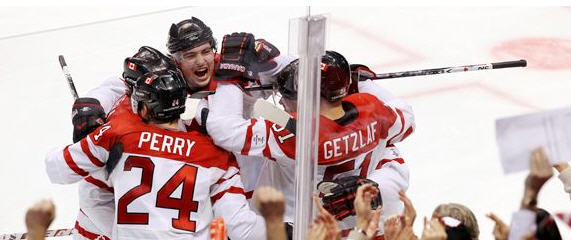Canada Beats USA in Overtime for Olympic Hockey Gold
 Team Canada beat Team USA 3-2 on an overtime goal by Sidney Crosby.
Team Canada beat Team USA 3-2 on an overtime goal by Sidney Crosby.
A shame for Team USA, which outplayed expectations, beating Canada in the early rounds and arriving undefeated in the gold medal game.
It’s a rather odd tournament structure for an undefeated team to face a rematch in the championship game against a team it beat along the way and then play a single-elimination showdown. There’s not much incentive to win the first game if the two teams contend as equals in the finals.
Still, Canada had to fight their way to the game the hard way, beating the Russians along the way. It’s probable that the better team won. And they were at home, to boot.
Team USA fought back after being down 2-0, scoring the tying game with an empty net with just seconds to go. Stellar stuff and, certainly, nothing to be ashamed of against a favored team with more veteran talent playing in front of its home crowd. Let alone with the winning shot made by a man widely considered the best hockey player in the world.
Still, being 1-1 against Canada in the tourney and finishing in second place behind Canada is rather hollow. Obviously, you’d much rather have lost the first one and won the second.
Ah, well. Back to not caring about hockey for another four years.

Too bad Mexico didn’t field a team … could had been a North American Sweep.
“Ah, well. Back to not caring about hockey for another four years.”
Ahem, excuse me, sir, are you not aware of the ascendancy of the Chicago Blackhawks?
Are you a commie?? ;->
Good game. And it’s high time that Crosby spend some of his well-earned money on a dentist to fix that overbite.
I don’t watch a ton of hockey, but I did graduate from the hockey capital of the south (UAH). That was damn near the best hockey game I’ve ever seen, and it was a blast to watch. I was (rather obviously) rooting for the US to win, but frankly, they don’t have anything to be ashamed of given the way they played.
Huh? You must not have followed the entire tournament. It is basically run like a mini NFL/MLB, NCAA Conference tourney etc…
There were three groups. During the first round you play each team in your group and the top team in each group got a second-round bye. The top second-place team (kind of like the wild-card in NFL/MLB) also got a second round bye for a total of 4 byes.
The rest of the tourney was played single-elimination.
There is an incentive to do well in the early rounds since you can get both a bye for the second round as well as a high seed to play less strong teams.
Most of the NCAA conference hoops tourneys work similarly–the best teams get byes in the tourney.
It is really not odd for a team to meet another in a title game that it had previously defeated. Remember the 1999 AFC title game? Both teams were in the AFC Central. Jacksonville had lost to Tennessee twice that season and met them in the AFC title game when Jacksonville lost to the Titans a third time.
At least we didn’t do anything embarassing like having our President award the US men’s hockey team a “platiunum medal”.
As to “odd tournament structure,” I’m not sure how else you would run it, but…
The goal with the net empty was very cool indeed. I have seen the goaltender pulled many times, and I think this is the first time I’ve actually seen it work. The better team did win, though.
I do have to admit to an old-fashioned preference for amateur Olympic days, when competitors were not full time paid professional players of the sport in which they are competing. Perhaps the Olympic Committee overdid it with the “Ohoh, the university bought you lunch; DQ.” thing, but watching NHL players is just not the same as it was at Lake Placid.
I get that. My problem is with the “mini” aspect. It’s one thing to do that over a long season. But to do it within the context of a two-week tourney is problematic. Better would be to have seedings based on pre-Olympic performance and either a single- or double-elimination tournament.
They already do this. The top 9 IIHF-ranked teams at the end of the world championship in 2008 got automatic bids to the Olympics and the remainder play in qualifying tournaments prior to the Olympics to get the remainder of the bids. The Olympic groupings were based on IIHF rankings and qualifying tournament performances.
This system is typical of most team Olympic sports (e.g. Football, Team Handball, etc…).
Sure, it’s just not a system that makes much sense to me for a short tournament. As you note, there’s already a long play-in to the tourney. So why have groupings and a play-in to the final round at all? Just run a single-elimination tourney ala the NCAA basketball setup or a double-elimination tourney ala the College World Series.
The tournament is run like many other international tournaments of its style, round-robin group stage with a single-elimination tournament afterwards. The first example I think of is pretty much every soccer tournament (World Cup, UEFA Europa Cup, Champions League, etc.) outside the US. Single-elimination just doesn’t give alot of bang-for-the-buck considering that many teams travelled quite a distance to be there and thus want to try and get at least a couple games for each team. Plus in the end it tends to downplay the results from a single game as much as is possible and produce a more representative winner than a single-elimination tournament.